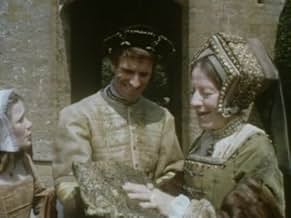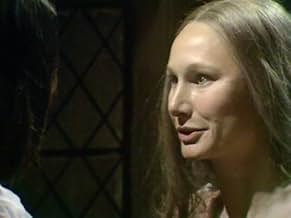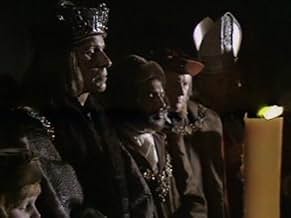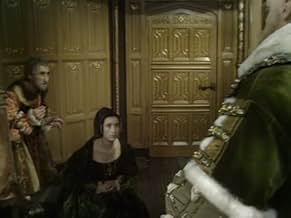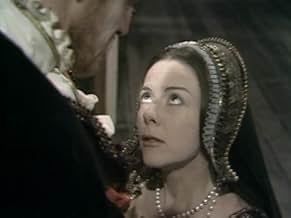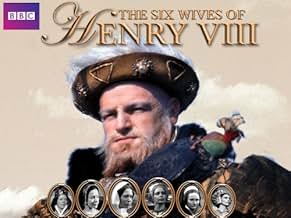The Six Wives of Henry VIII
- Minissérie de televisão
- 1970
- 9 h
AVALIAÇÃO DA IMDb
8,4/10
1,5 mil
SUA AVALIAÇÃO
Adicionar um enredo no seu idiomaA six-episode dramatization of Henry VIII's relationships with each of his six wives. Each episode is devoted to one wife, and is a complete play in itself.A six-episode dramatization of Henry VIII's relationships with each of his six wives. Each episode is devoted to one wife, and is a complete play in itself.A six-episode dramatization of Henry VIII's relationships with each of his six wives. Each episode is devoted to one wife, and is a complete play in itself.
- Ganhou 1 Primetime Emmy
- 7 vitórias e 8 indicações no total
Explorar episódios
Avaliações em destaque
I have seen this series many times and enjoy it immensely every time I see it. I have read a number of biographies of Henry VII and this series is the most accurate portrayal of Henry VIII I have seen, making him a sympathetic character in spite of the way he treated some of his wives (in contrast, "The Private Life of Henry VIII," with Charles Laughton as Henry, is absolutely ludicrous in its portrayal of Henry and his wives). Watching this series gives one a good understanding of how a king could go through six wives, having two of them executed and one driven to an early death through mistreatment. Yet he is never exactly hero or villain, he is portrayed as a human being, who only once went into a marriage that was not for love, and quickly got out of it (through annulment). Anyone who is interested in the history of England's monarchy should enjoy this series. And a good follow up series is "Elizabeth R", with Glenda Jackson playing the title role (quite excellently).
I first saw this BBC production at 13 in 1971, and was simply fascinated. I have seen it several times since, and it's always fresh and interesting to watch. Keith Mitchell is excellent as Henry VIII, and I found no fault with the acting or history of the series. Well-cast, well-acted. I must say that my favorite episodes were Dorothy Tutin as Anne Boleyn and the very unfortunate young Katherine Howard, played by Angela Pleasence. I was surprised that she is the daughter of of Donald Pleasance. All of the episodes are outstanding, and are educational as well. Keith Mitchell plays Henry the VIII with all the conceited, bombastic, loving, hating and self-indulging qualities that history describes him as having. A must-see for lovers of drama, romance, and English History. 10 out of 10 stars easily.
This is one of the most popular and best-remembered BBC drama productions of all time. As well as drawing record audiences in the early seventies, it spawned the equally impressive follow-up - Elizabeth R. The Six Wives of Henry VIII is not held in such high regard without good reason. It is perhaps the most historically accurate dramatic account of this period in history we will ever see.
As well as its accuracy, the series is remembered for the performances of the actors. Keith Michell shines throughout as King Henry aging from an athletic young prince to a monstrously obese tyrant. All of the actresses deliver sterling performances as the wives. Standouts from the supporting cast include Sheila Burrell as the conniving Lady Rochford, Wolfe Morris as manipulative Thomas Cromwell, Patrick Troughton as the Duke of Norfolk and Bernard Hepton as Archbishop Cranmer, a role he was to reprise in Elizabeth R and the 1973 cinema remake of this series.
The costumes and makeup for this series cannot go unmentioned. They are little short of outstanding. One would almost believe Keith Michell was swapped for an older, fatter actor for the latter three episodes and the costumes change throughout, depicting shifts in courtly fashions.
CATHERINE OF ARAGON Perhaps the least lavish play in terms of production values, but among the better ones for scripting and acting. It begins, rather ploddingly, by covering Catherine's time in England before her marriage to Henry. When they do wed, the story skips abruptly to Henry's courtship with Anne Boleyn and the divorce of Catherine. Midway through this episode Anne Boleyn is Queen and Catherine is left dying away from court. It closes with her death in 1536.
ANNE BOLEYN A somewhat disappointing installment, despite wonderful acting and a sharp script. Anne is without a doubt the most famous wife of Henry VIII and the one who has provoked the most interest from historians, yet much of her life goes untold in this series. The earlier events in her story were rushed through in a handful of scenes in the second half of the Catherine of Aragon episode, and this episode focuses entirely on her downfall. Half of this play is dedicated to the last eighteen days of Anne's life, in the tower. Dorothy Tutin's fine performance brings this play back on par with the better ones in the series though.
JANE SEYMOUR Something of an anomaly within this series. It breaks with the continuity of the other five plays by covering events that had already been dealt with in Anne Boleyn's episode. The result is that Anne's execution is depicted twice during the course of the series. It also stands out from the rest in terms of production. The other five episodes are filmed as theatrical pieces whilst Jane Seymour is visibly an example of television drama. It's a shame that perhaps the dullest of Henry's wives gets by far the best treatment in the series. The real mystery of this episode is why the format suddenly changes before reverting back to the old style for the final three installments.
ANNE OF CLEVES It was never going to be easy to write a ninety-minute play about a largely unimportant, six-month-long mistake, but everybody involved seems to have made their best efforts here. Anne of Cleves is interpreted as being far more intelligent and witty than she cared to show in the English court and Elvi Hale plays her well. It's very absorbingly written too.
CATHERINE HOWARD It's difficult to decide what to make of this episode. The script has Catherine as a match for her ill-fated cousin, Anne Boleyn, with cunning intelligence, when she was, in fact, a frivolous girl who was thrust too high for her own good. It is, nonetheless, a good adaptation of her story and Sheila Burrell is fantastic as Lady Rochford. As with all the other episodes, there is a reluctance to paint Henry in a bad light here and Catherine almost comes out as the villain of the piece.
CATHERINE PARR Perhaps the most neglected wife in public interest, Catherine Parr's story is actually full of intrigue. This episode deals with her strong religious views and her enforcement of them which nearly sent her to a grizzly fate. Unlike the others in the series, this play relies heavily on dialogue rather than action and it closes the story well.
So the only real failing of the series is not that it is shown in six episodes, but that one episode is dedicated to each wife. The story could have been told more comprehensively if parts 1-3 dealt with Catherine of Aragon's time as Queen, her fall from grace in favour of Anne Boleyn, the divorce, the religious reforms brought about by the King's desire to marry Anne Boleyn and have her children as heirs to the throne, Anne's marriage to the King and her eventual downfall. Jane Seymour would be best dealt with in part 4, Anne of Cleves and Catherine Howard merged together in the fifth part, whilst Catherine Parr and the King's death could be covered in the sixth.
This criticism aside, the series has earned every word of praise ever spoken for it. It is one of the best nine hours you can spend watching a television drama, so go out and watch it.
As well as its accuracy, the series is remembered for the performances of the actors. Keith Michell shines throughout as King Henry aging from an athletic young prince to a monstrously obese tyrant. All of the actresses deliver sterling performances as the wives. Standouts from the supporting cast include Sheila Burrell as the conniving Lady Rochford, Wolfe Morris as manipulative Thomas Cromwell, Patrick Troughton as the Duke of Norfolk and Bernard Hepton as Archbishop Cranmer, a role he was to reprise in Elizabeth R and the 1973 cinema remake of this series.
The costumes and makeup for this series cannot go unmentioned. They are little short of outstanding. One would almost believe Keith Michell was swapped for an older, fatter actor for the latter three episodes and the costumes change throughout, depicting shifts in courtly fashions.
CATHERINE OF ARAGON Perhaps the least lavish play in terms of production values, but among the better ones for scripting and acting. It begins, rather ploddingly, by covering Catherine's time in England before her marriage to Henry. When they do wed, the story skips abruptly to Henry's courtship with Anne Boleyn and the divorce of Catherine. Midway through this episode Anne Boleyn is Queen and Catherine is left dying away from court. It closes with her death in 1536.
ANNE BOLEYN A somewhat disappointing installment, despite wonderful acting and a sharp script. Anne is without a doubt the most famous wife of Henry VIII and the one who has provoked the most interest from historians, yet much of her life goes untold in this series. The earlier events in her story were rushed through in a handful of scenes in the second half of the Catherine of Aragon episode, and this episode focuses entirely on her downfall. Half of this play is dedicated to the last eighteen days of Anne's life, in the tower. Dorothy Tutin's fine performance brings this play back on par with the better ones in the series though.
JANE SEYMOUR Something of an anomaly within this series. It breaks with the continuity of the other five plays by covering events that had already been dealt with in Anne Boleyn's episode. The result is that Anne's execution is depicted twice during the course of the series. It also stands out from the rest in terms of production. The other five episodes are filmed as theatrical pieces whilst Jane Seymour is visibly an example of television drama. It's a shame that perhaps the dullest of Henry's wives gets by far the best treatment in the series. The real mystery of this episode is why the format suddenly changes before reverting back to the old style for the final three installments.
ANNE OF CLEVES It was never going to be easy to write a ninety-minute play about a largely unimportant, six-month-long mistake, but everybody involved seems to have made their best efforts here. Anne of Cleves is interpreted as being far more intelligent and witty than she cared to show in the English court and Elvi Hale plays her well. It's very absorbingly written too.
CATHERINE HOWARD It's difficult to decide what to make of this episode. The script has Catherine as a match for her ill-fated cousin, Anne Boleyn, with cunning intelligence, when she was, in fact, a frivolous girl who was thrust too high for her own good. It is, nonetheless, a good adaptation of her story and Sheila Burrell is fantastic as Lady Rochford. As with all the other episodes, there is a reluctance to paint Henry in a bad light here and Catherine almost comes out as the villain of the piece.
CATHERINE PARR Perhaps the most neglected wife in public interest, Catherine Parr's story is actually full of intrigue. This episode deals with her strong religious views and her enforcement of them which nearly sent her to a grizzly fate. Unlike the others in the series, this play relies heavily on dialogue rather than action and it closes the story well.
So the only real failing of the series is not that it is shown in six episodes, but that one episode is dedicated to each wife. The story could have been told more comprehensively if parts 1-3 dealt with Catherine of Aragon's time as Queen, her fall from grace in favour of Anne Boleyn, the divorce, the religious reforms brought about by the King's desire to marry Anne Boleyn and have her children as heirs to the throne, Anne's marriage to the King and her eventual downfall. Jane Seymour would be best dealt with in part 4, Anne of Cleves and Catherine Howard merged together in the fifth part, whilst Catherine Parr and the King's death could be covered in the sixth.
This criticism aside, the series has earned every word of praise ever spoken for it. It is one of the best nine hours you can spend watching a television drama, so go out and watch it.
Impeccable in casting, sets, dialogue, and period feel. All of the principals are magnificent; but the actors who play Stephen Gardiner and Robert Barnes are simply extraordinary. The much-maligned Keith Michell is still the best Henry this century, easily brushing aside Robert Shaw, Richard Burton, and Charles Laughton. Michell's combination of vanity, insecurity, overweening machismo, and determination to stay top dog at all costs is painful but fascinating to watch. This TV series does full justice to all facets of the Tudor period; best of all, it reveals extra magical touches with each re-viewing. Which means, in short, that this is a video which you should buy, rather than rent.
This is a set I'd love to own. The costumes are great, and acting is even greater, especially Keith Michel. He brings real depth to Henry and we see him as the interesting, complex man that he was, not just the selfish, bloated glutton of his later years. The court intrigue and politics, and also the costumes are expertly presented and you get a real feel for the times. The only flaw was that the actresses were generally too old for the parts they played, but there aren't many young actresses of this caliber, so one has to suspend disbelief and just enjoy the show. If I had to choose the best performance of the wives, I'd choose Annette Crosbie as Catherine of Aragon.
Você sabia?
- CuriosidadesKeith Michell was one hundred eighty-eight centimeters (six feet one inch) tall, the same height as the real Henry VIII.
- ConexõesFeatured in The 24th Annual Primetime Emmy Awards (1972)
Principais escolhas
Faça login para avaliar e ver a lista de recomendações personalizadas
- How many seasons does The Six Wives of Henry VIII have?Fornecido pela Alexa
Detalhes
- Data de lançamento
- País de origem
- Idioma
- Também conhecido como
- Die sechs Frauen Heinrich VIII
- Empresa de produção
- Consulte mais créditos da empresa na IMDbPro
Contribua para esta página
Sugerir uma alteração ou adicionar conteúdo ausente

Principal brecha
By what name was The Six Wives of Henry VIII (1970) officially released in India in English?
Responda
